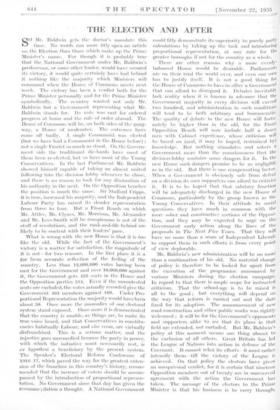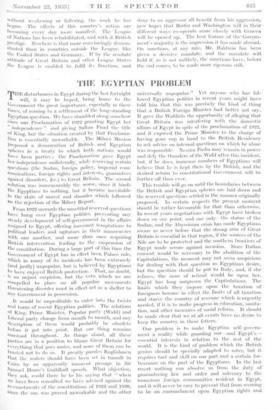THE ELECTION AND AFTER
SO Mr. Baldwin gets the doctor's mandate this time. No words can more fitly open an article on the Election than those which make up the Prime
Minister's name. For though it is probably true that the National Government under Mr. Baldwin's predecessor, or some other leader, would have secured its victory, it would quite certainly have had behind
it nothing like the majority which Ministers will command when the House cif' COmnions meets next week. The victory has been a verdict both for the Prime Minister personally and for the Prime Minister symbolically. The country wanted not only Mr.
Baldwin but a Government representing what Mr. BaldWin stands for. Its vote was cast fOr ordered progress at' home and the rule of order abroad.- The House of Commons will be, on both sides of the gang- Way, a 'House 'of moderates. The extremes hate come off badly. A single Communist was elected (but we have had a Communist in the House before) ; not a single Fascist so much as stood. On the Govern- ment side the traditional die-hards have most of them been re-elected, but so have most of the Young Conservatives. In the last. Parliament Mr. Baldwin showed himself capable of taking an almost united following into the division lobby whenever he ehbse, and there is no reason to look for any dithinution of his authority in the next. On the Opposition benches the position is much the same. Sir Stafford Cripps, it is true, increased his Majority, and the Independent -Labour Party has raised its slender representation from three to four. But a Front Bench on which Mr. Attlee, Mr. Clynes, Mr. Morrison, Mr. Alexander and Mr. Lees-Smith will be Conspicuous is not of the stuff of revolutions, and the rank-and-file behind arc likely to be content with their leaderS' pace.
What is wrong with the new House is that it is too like the old. While the fact of the Government's victory is a matter for satisfaction, the Magnitude of it is not—for two reasons. In the 'first place it is a far from accurate reflection of the feeling of the country. Less than 12,000,000 votes having been 'cast for the Government and over 10,000,000 against it, the Government gets 428 seats in the House and the Opposition partieS'184.' Even if the uncontested Seats arc excluded, the votes actually recorded give the Government 404 'members against 768. Under Pro- portional Representation the majority would have been about 50. Onee more the anothalieS of our electoral system stand exposed. Once more it is demonstrated that the country is unable, as things are, to make its true voice heard, and that ConserVatives in constitu- encies habitually Labour, and vice versa, are virtually disfranchised. This is a serious matter, and the injustice goes unremedied because the party in power, with •which the initiative must necessarily rest, is hypothesi a beneficiary by the present system. The Speaker's Electoral Reform Conference of 1916-17, which paved the way for the greatest, exten- sion of the franchise in this country's history, recom, mended that the increase of voters should be accom- panied by the introduction of proportional represen- tation. No Government since that day has `given the recomme7dation a thought. A National Government
could fitly demonstrate its Superiority to purely party calculations by taking up the task and introducing proportional representation, at any rate for the greater boroughs if not for the country as a whole.
There are other reasons why a more evenly- balanced House would be desirable. Parliaments are on their trial the world over, and even our own has to justify itself. It is not a good thing for thc'House of Commons to have in office a Government that can afford to disregard it. Debates inevitablY lack reality when it is .knoWn in advance that the Government majority in every division will exceed two hundred, and adMinistration in sueh 'Conditions will tend' to be both arbitrary and bureaucratic, 'The quality of debate in the' new Hotise will fortik nately be 'higher than in the old, for the FrOnt Opposition Beneh will now include half' a dozen men with Cabinet experience, whose criticism Wig be based on (and, it may be hoped, restrained by) .knoWledge. But nothing stiMulates and sobers P, Government more than the consciousness that the division-lobby contains some dangers for it. In the new House such dangerS promise to be as negligible as in the old. But there is one compensating factor. When a Government is obviously safe from defeat On a division its own supporters can afford to Criticise it. It is to be hoped that that salutary function will be adequately discharged in the new House of Commons, particularly by the group known as the Young Conservatives. In their attitude to social questions. they. have Much in common with the more sober and constructive sections of the Opposi' Con, and they may be expected to urge. on the Government early • action along the lines • of the proposals in The Next Five Years. That they will have no more than a score of Independent Liberals to support them in such efforts is from' every point of view deplorable.
Mr. Baldwin's new administration will be no more than a continuation of his old. No material change of policy- is therefore to he looked for apart froni the 'execution of the programme announced by various Ministers during the election • campaign In regard to that there is ample scope for instructed criticism. That the school-age is to be raised is all to the good ; but everything will 'depend on the way. that reform is carried out and the date fixed for its' adoption. The announcement of neW road-construction. and other public works was rightly welcomed ; it will be for the Government's opponents and supporters alike to sec that its plans in that field are extended, not curtailed. But Mr. Baldwin's policy at this moment means one thing almost to the exclusion of all others. Great Britain has led the League of 'Nations into action in defence of the Covenant. It cannot relax its efforts—it must rather intensify them—till the victory. of the League is achieved. On that policy the electors have given an unequivocal verdict, for it is certain that nineteen Opposition members out of twenty are in unreserved agreement with the action the GovernMent has taken.. The message of the electors to the Prime Minister is that his . businesS is to carry through, without weakening or faltering, the work he has begun. The effects of this country's action are becoming every day more' manifest. The League of Natioes has been rehabilitated, and with it British prestige. Nowhere is. that more •convincingly • demon- strated than in countries outside the League, like • the United. States and Germany. If by the resolute attitude of Great Britain and other League ..States . the League is enabled to ..fulfil its function, and
deny to an aggressor all benefit from his aggression,' new. hopes! that Berlin and Washington will in their different Ways co-operate more closely with Geneva will be opened up. The best feature of the Govern- ment's majority is the impression it has made abroad. On sanctions, at any rate, Mr. Baldwin has been given a decisive mandate, and the • mandate - will hold if, as is not unlikely, the sanctions have, before the end comes, to be made more rigorous still.































































































 Previous page
Previous page